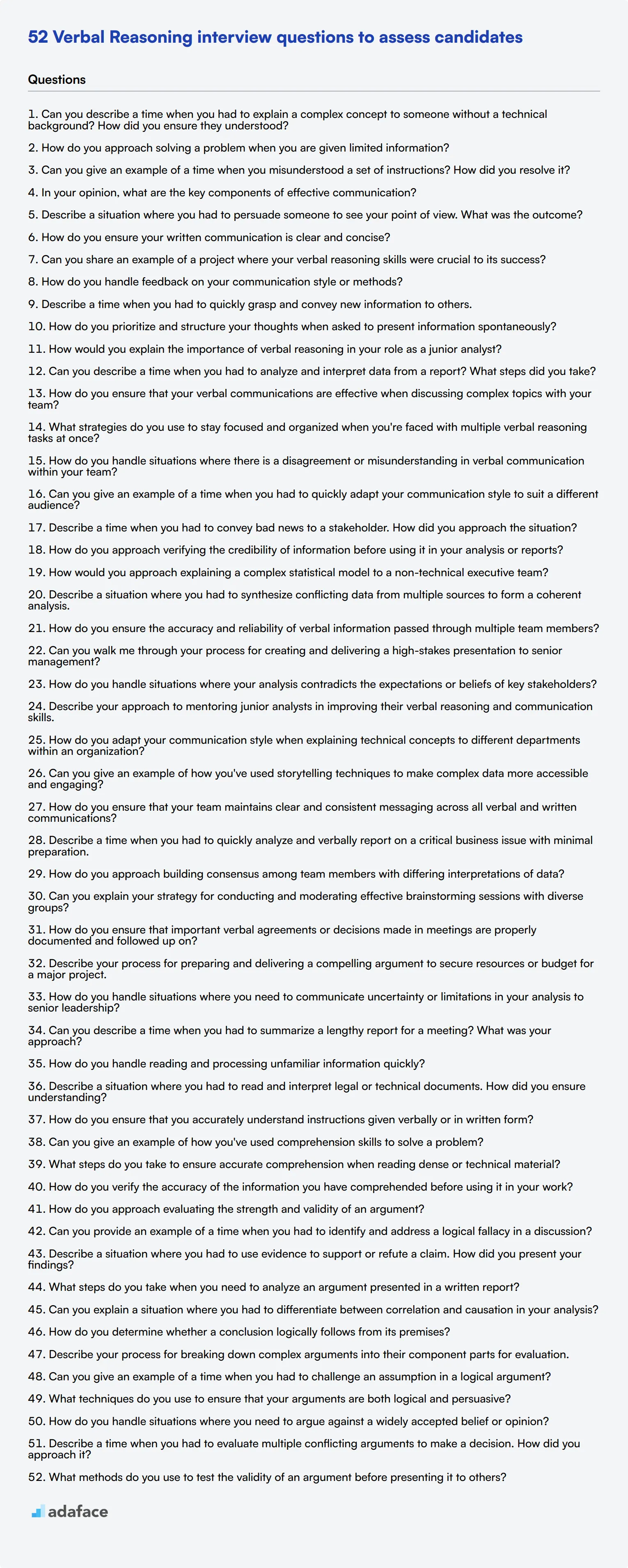Verbal reasoning skills are key indicators of a candidate's ability to process and analyze complex information. As a recruiter or hiring manager, having a set of well-crafted verbal reasoning interview questions can help you identify top talent and make informed hiring decisions.
This blog post offers a comprehensive list of verbal reasoning questions tailored for different experience levels and specific skill areas. From initial interview starters to advanced questions for senior analysts, we cover a wide range of scenarios to help you assess candidates effectively.
By using these questions, you can gain valuable insights into a candidate's critical thinking and communication abilities. Additionally, consider using a verbal reasoning assessment before interviews to streamline your hiring process and focus on the most promising candidates.
Table of contents
10 Verbal Reasoning interview questions to initiate the interview
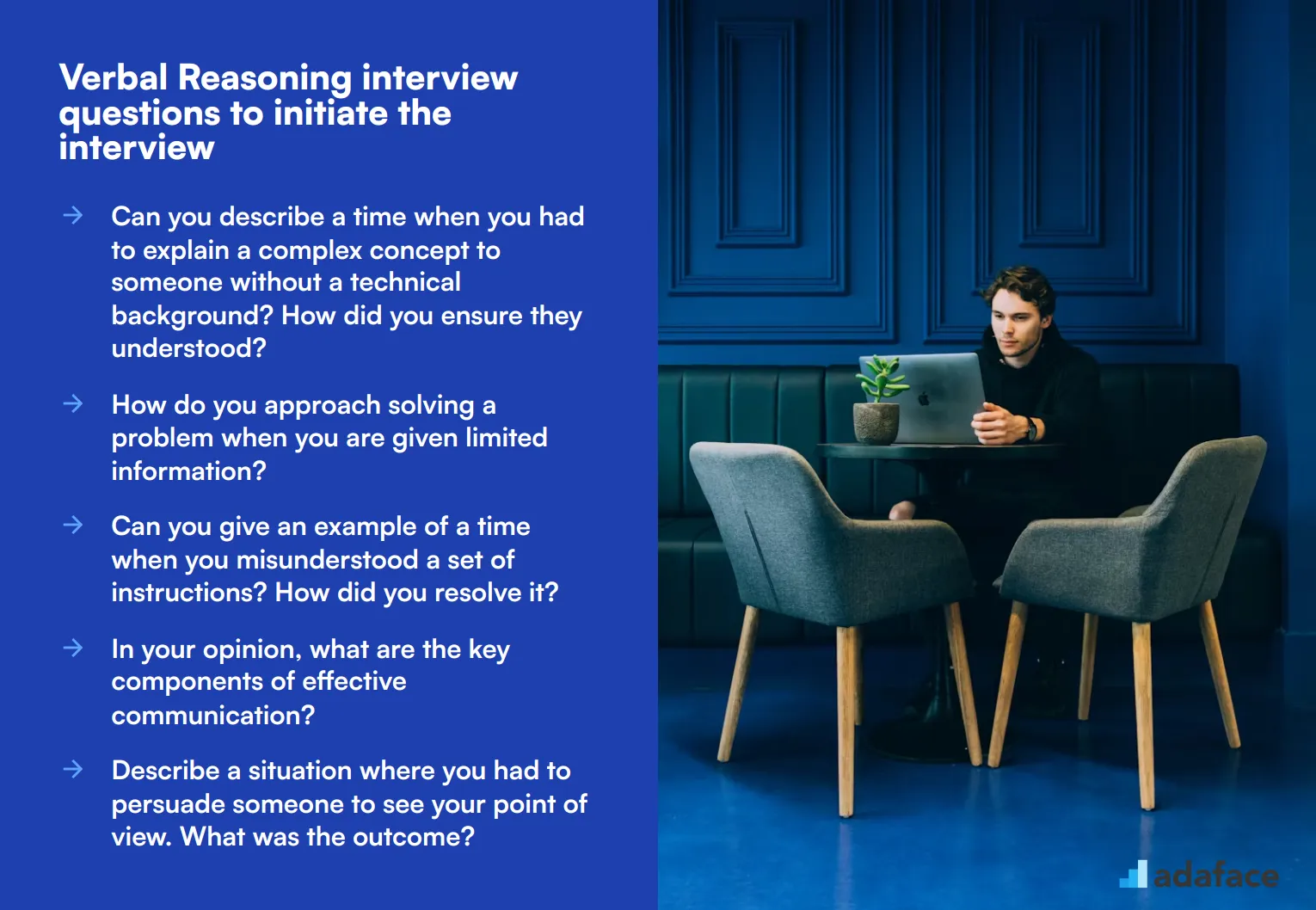
To effectively evaluate a candidate's verbal reasoning skills during the interview process, consider using this curated list of questions. These questions are designed to help you assess the applicant's ability to understand, analyze, and articulate information clearly. For more detailed role-specific questions, you might find our business analyst job description helpful.
- Can you describe a time when you had to explain a complex concept to someone without a technical background? How did you ensure they understood?
- How do you approach solving a problem when you are given limited information?
- Can you give an example of a time when you misunderstood a set of instructions? How did you resolve it?
- In your opinion, what are the key components of effective communication?
- Describe a situation where you had to persuade someone to see your point of view. What was the outcome?
- How do you ensure your written communication is clear and concise?
- Can you share an example of a project where your verbal reasoning skills were crucial to its success?
- How do you handle feedback on your communication style or methods?
- Describe a time when you had to quickly grasp and convey new information to others.
- How do you prioritize and structure your thoughts when asked to present information spontaneously?
8 Verbal Reasoning interview questions and answers to evaluate junior analysts
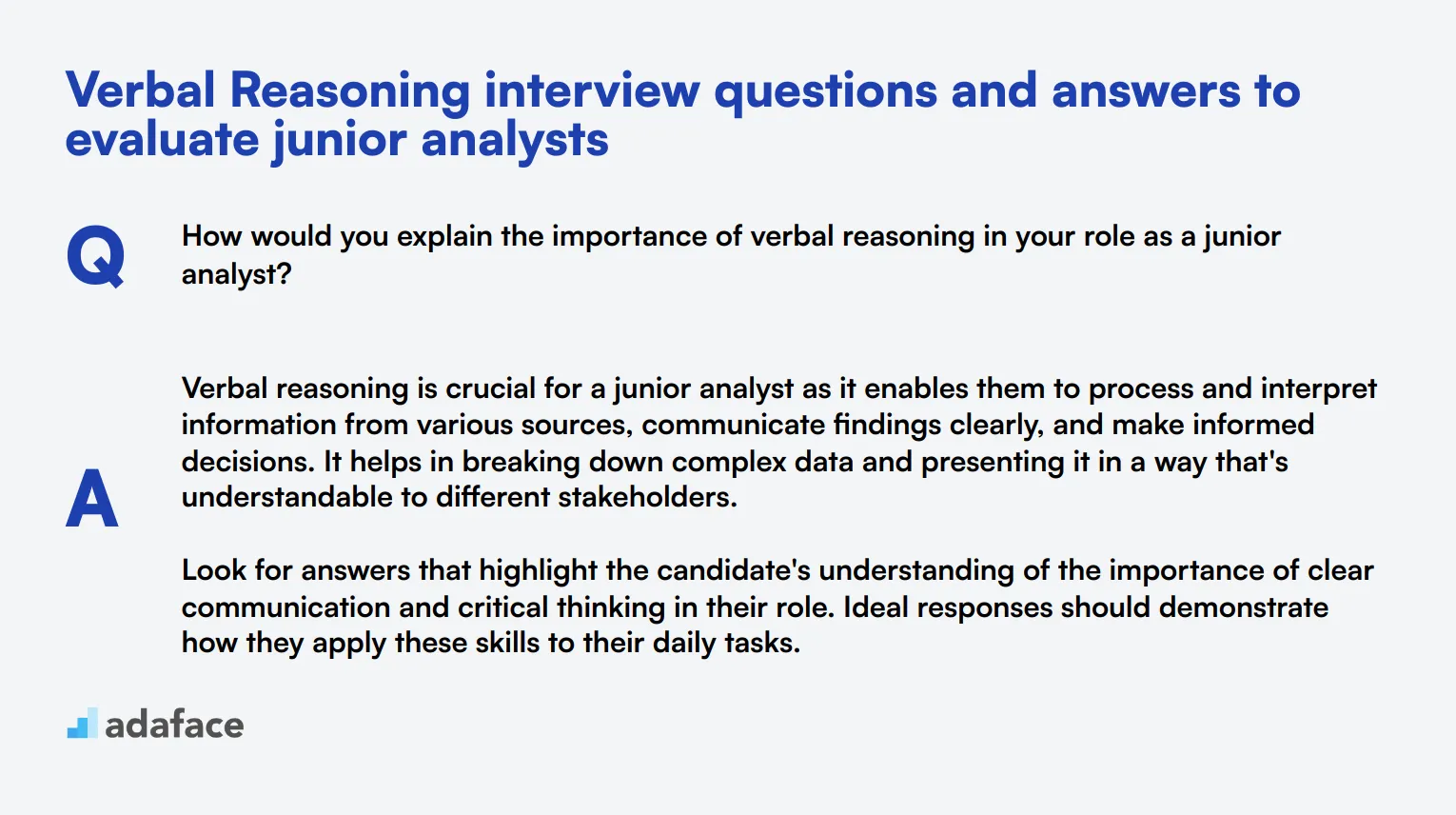
To evaluate the verbal reasoning skills of junior analysts during interviews, this list of questions can help you identify candidates who can think critically, communicate effectively, and solve problems efficiently. Use these questions to discern how well candidates can handle real-world scenarios that demand strong verbal reasoning abilities.
1. How would you explain the importance of verbal reasoning in your role as a junior analyst?
Verbal reasoning is crucial for a junior analyst as it enables them to process and interpret information from various sources, communicate findings clearly, and make informed decisions. It helps in breaking down complex data and presenting it in a way that's understandable to different stakeholders.
Look for answers that highlight the candidate's understanding of the importance of clear communication and critical thinking in their role. Ideal responses should demonstrate how they apply these skills to their daily tasks.
2. Can you describe a time when you had to analyze and interpret data from a report? What steps did you take?
In one of my previous roles, I was tasked with analyzing a monthly sales report. I started by identifying key metrics such as total sales, regional performance, and product-wise sales. I then cross-referenced this data with historical trends to identify any anomalies or patterns.
I summarized my findings in a report and presented it to the management team, highlighting areas of concern and opportunities for growth. This process involved critically evaluating the data and ensuring my interpretations were backed by solid evidence.
Recruiters should look for candidates who demonstrate a structured approach to data analysis and can clearly articulate their thought process and findings.
3. How do you ensure that your verbal communications are effective when discussing complex topics with your team?
To ensure effective communication, I always start by understanding my audience's level of knowledge on the topic. I break down complex concepts into simpler terms and use analogies or examples that are relevant to them. I also encourage questions and provide clarifications to ensure everyone is on the same page.
Additionally, I use visual aids like charts or graphs to support my points, making it easier for others to grasp the information.
Look for candidates who emphasize the importance of adapting their communication style to suit their audience and who use various methods to ensure clarity and understanding.
4. What strategies do you use to stay focused and organized when you're faced with multiple verbal reasoning tasks at once?
I prioritize my tasks based on their urgency and importance, creating a to-do list to keep myself organized. Breaking down larger tasks into smaller, manageable steps helps me stay focused. I also set aside specific time blocks for each task to avoid multitasking, which can lead to errors.
Staying organized and maintaining focus are crucial for handling multiple verbal reasoning tasks efficiently. Using tools like calendars, reminders, and task management apps also helps me stay on track.
Recruiters should look for candidates who demonstrate effective time management and organizational skills, as these are essential for maintaining productivity and accuracy in a fast-paced work environment.
5. How do you handle situations where there is a disagreement or misunderstanding in verbal communication within your team?
When faced with a disagreement or misunderstanding, I first ensure that everyone has a chance to voice their perspectives. I listen actively to understand the root cause of the issue. I then work towards finding common ground and facilitating a constructive discussion to resolve the disagreement.
If needed, I reiterate key points or provide additional context to clear up any misunderstandings. The goal is to ensure that communication remains respectful and focused on finding a solution.
Look for candidates who show a proactive and empathetic approach to conflict resolution and who prioritize clear and respectful communication.
6. Can you give an example of a time when you had to quickly adapt your communication style to suit a different audience?
In my previous role, I had to present a detailed financial report to both the finance team and the marketing team. While the finance team was familiar with the technical jargon, the marketing team was not. I adapted my presentation by simplifying the terminology for the marketing team and focusing on the key takeaways relevant to them.
I used more visual aids and real-world examples to make the data more relatable and understandable for the marketing team.
Recruiters should look for candidates who can demonstrate flexibility in their communication style and the ability to tailor their message to different audiences effectively.
7. Describe a time when you had to convey bad news to a stakeholder. How did you approach the situation?
When I had to inform a client about a delay in project delivery, I approached the situation with transparency and empathy. I explained the reasons for the delay and provided a revised timeline. I also highlighted the steps we were taking to ensure such delays wouldn't occur in the future.
I made sure to listen to their concerns and offer solutions to mitigate any negative impact on their operations.
Look for candidates who demonstrate honesty, empathy, and problem-solving skills when delivering bad news. Their ability to handle such situations with professionalism is a key indicator of their communication prowess.
8. How do you approach verifying the credibility of information before using it in your analysis or reports?
To verify the credibility of information, I cross-check data from multiple reputable sources. I look for consistency in the information and ensure it comes from sources with a strong track record of reliability. I also evaluate the methodology used to gather the data to ensure it meets the necessary standards.
Additionally, I consult with subject matter experts if needed to validate the information further.
Recruiters should look for candidates who prioritize accuracy and thoroughness in their work, demonstrating a commitment to using credible information in their analysis.
15 advanced Verbal Reasoning interview questions to ask senior analysts
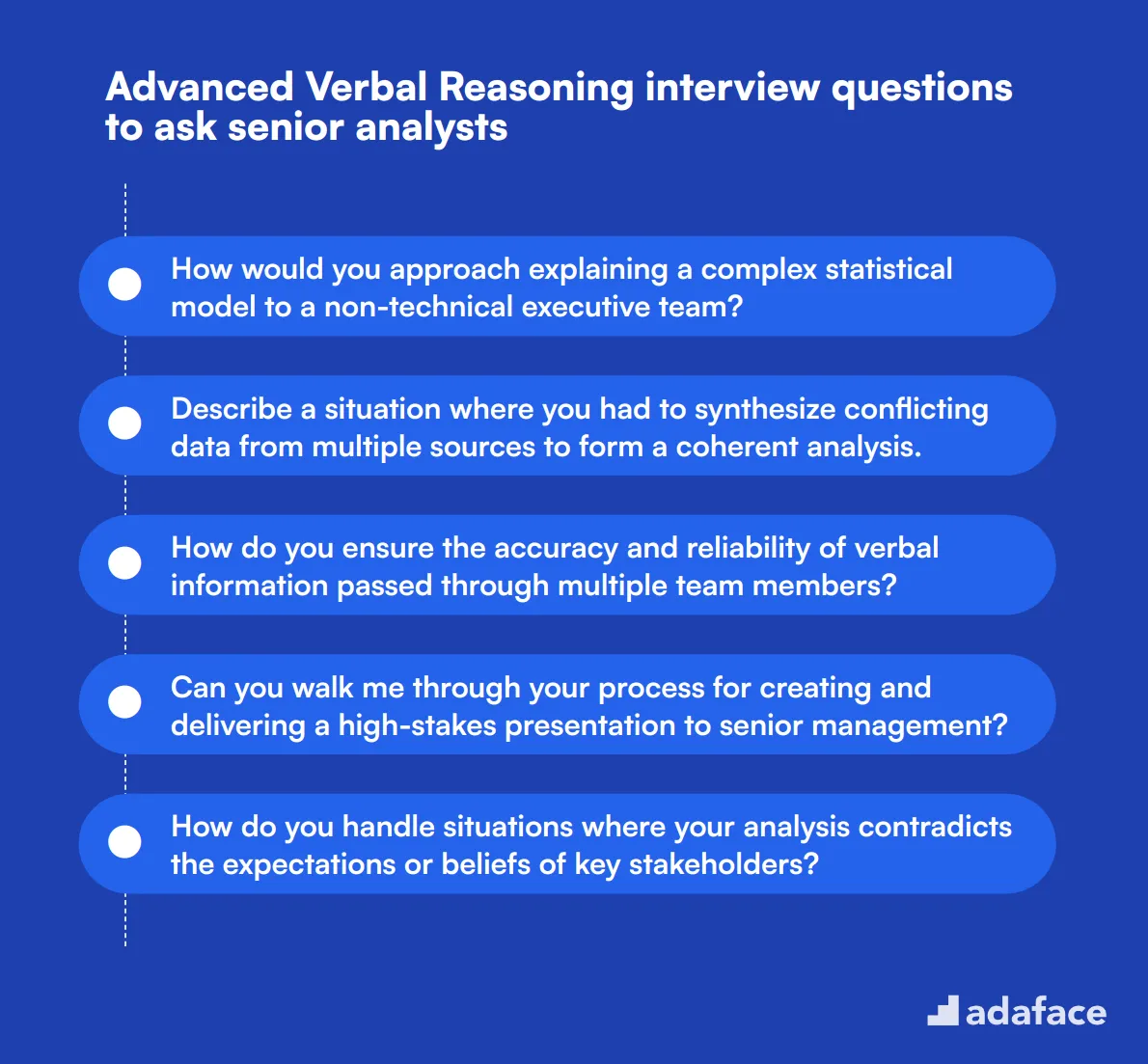
When interviewing senior analysts, it's crucial to assess their advanced verbal reasoning skills. These questions are designed to evaluate their ability to communicate complex ideas, analyze intricate information, and lead teams effectively. Use them to gauge candidates' expertise and problem-solving capabilities in high-level analytical roles.
- How would you approach explaining a complex statistical model to a non-technical executive team?
- Describe a situation where you had to synthesize conflicting data from multiple sources to form a coherent analysis.
- How do you ensure the accuracy and reliability of verbal information passed through multiple team members?
- Can you walk me through your process for creating and delivering a high-stakes presentation to senior management?
- How do you handle situations where your analysis contradicts the expectations or beliefs of key stakeholders?
- Describe your approach to mentoring junior analysts in improving their verbal reasoning and communication skills.
- How do you adapt your communication style when explaining technical concepts to different departments within an organization?
- Can you give an example of how you've used storytelling techniques to make complex data more accessible and engaging?
- How do you ensure that your team maintains clear and consistent messaging across all verbal and written communications?
- Describe a time when you had to quickly analyze and verbally report on a critical business issue with minimal preparation.
- How do you approach building consensus among team members with differing interpretations of data?
- Can you explain your strategy for conducting and moderating effective brainstorming sessions with diverse groups?
- How do you ensure that important verbal agreements or decisions made in meetings are properly documented and followed up on?
- Describe your process for preparing and delivering a compelling argument to secure resources or budget for a major project.
- How do you handle situations where you need to communicate uncertainty or limitations in your analysis to senior leadership?
7 Verbal Reasoning interview questions and answers related to comprehension skills
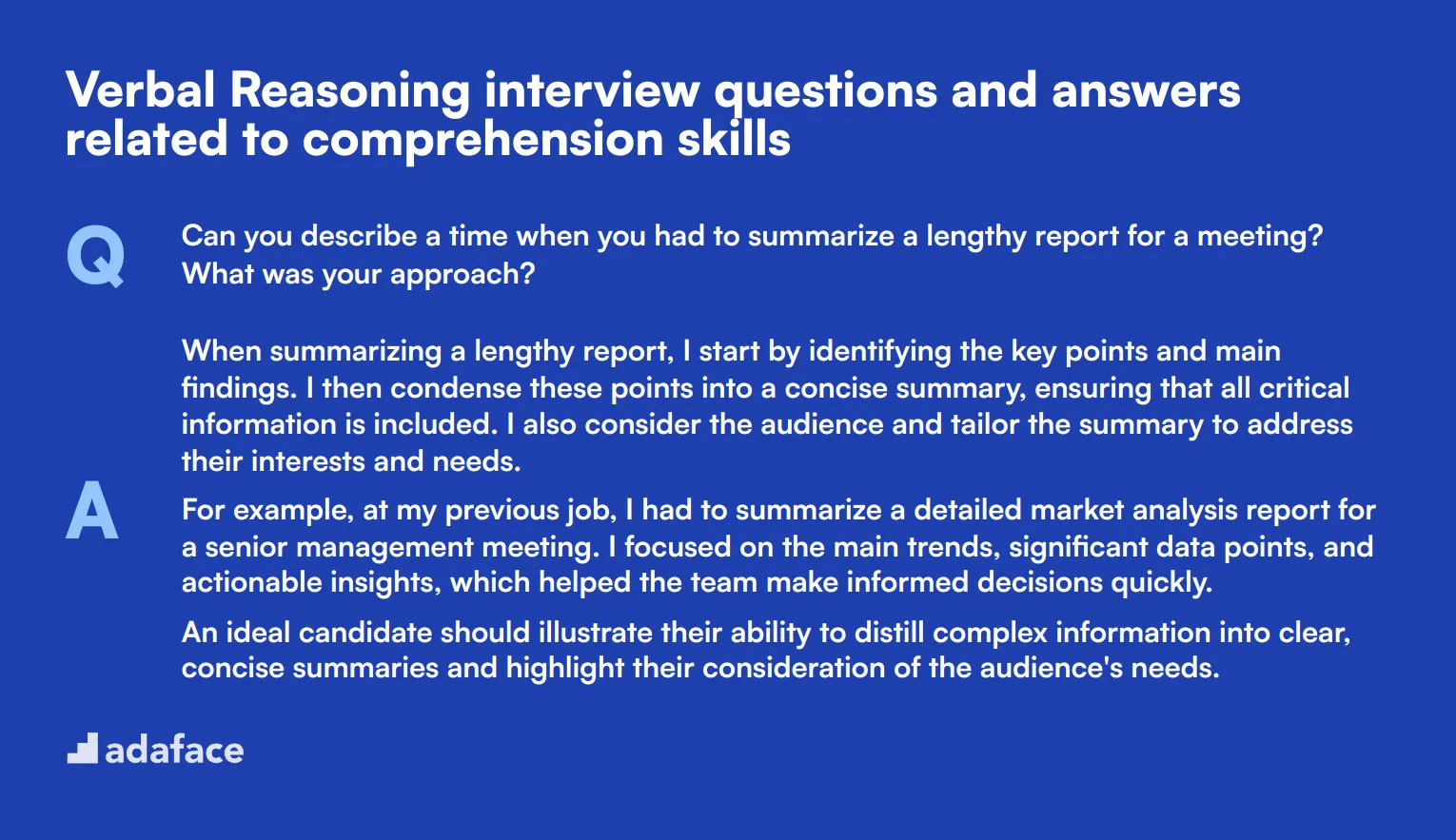
To evaluate whether your candidates possess strong comprehension skills, these verbal reasoning interview questions are essential. These questions will help you determine if candidates can effectively understand, interpret, and communicate information, which is critical in many roles.
1. Can you describe a time when you had to summarize a lengthy report for a meeting? What was your approach?
When summarizing a lengthy report, I start by identifying the key points and main findings. I then condense these points into a concise summary, ensuring that all critical information is included. I also consider the audience and tailor the summary to address their interests and needs.
For example, at my previous job, I had to summarize a detailed market analysis report for a senior management meeting. I focused on the main trends, significant data points, and actionable insights, which helped the team make informed decisions quickly.
An ideal candidate should illustrate their ability to distill complex information into clear, concise summaries and highlight their consideration of the audience's needs.
2. How do you handle reading and processing unfamiliar information quickly?
When faced with unfamiliar information, I employ active reading strategies like skimming for main ideas, highlighting key points, and taking brief notes. This helps me to grasp the core concepts efficiently.
Additionally, I break down the information into manageable sections and summarize each part in my own words. This not only improves my understanding but also aids in retention.
Look for candidates who demonstrate effective strategies for quickly absorbing and processing new information. Follow up by asking them to explain a complex topic they recently learned.
3. Describe a situation where you had to read and interpret legal or technical documents. How did you ensure understanding?
When interpreting legal or technical documents, I start by reading through the entire document to get a general sense of its structure and content. Then, I focus on specific sections that require deeper understanding, often seeking out definitions for unfamiliar terms.
In one instance, I had to review a contract for a new vendor partnership. I took the time to annotate the document with my questions and consulted with subject matter experts to clarify any ambiguities. This ensured that I fully understood the terms before proceeding.
Candidates should show their methodical approach to comprehending complex documents and their willingness to seek additional clarification when necessary.
4. How do you ensure that you accurately understand instructions given verbally or in written form?
To ensure I understand instructions accurately, I actively listen or read thoroughly and then repeat or paraphrase the instructions back to the sender. This helps confirm my understanding and allows for any necessary clarification.
For instance, during a project kick-off meeting, I make it a point to summarize the key tasks and deadlines discussed, confirming them with the team to avoid any misunderstandings.
Ideal responses will highlight the candidate's proactive communication skills and their habit of verifying understanding through feedback mechanisms.
5. Can you give an example of how you've used comprehension skills to solve a problem?
In a previous role, I had to analyze customer feedback to identify recurring issues with a product. I read through numerous feedback entries, noted common themes, and summarized the findings in a report.
By comprehending and synthesizing the feedback effectively, I was able to pinpoint a design flaw that was causing dissatisfaction. This led to a product update that significantly improved customer satisfaction.
Candidates should demonstrate their ability to use comprehension skills to identify problems and propose effective solutions, showcasing their analytical and problem-solving abilities.
6. What steps do you take to ensure accurate comprehension when reading dense or technical material?
When reading dense or technical material, I break the content into smaller sections and tackle them one at a time. I also take notes and summarize each section in my own words to reinforce understanding.
If I encounter particularly challenging sections, I may re-read them, consult supplementary resources, or discuss them with colleagues to gain different perspectives.
Look for candidates who demonstrate a systematic approach to comprehending complex material and their proactive strategies for overcoming comprehension challenges.
7. How do you verify the accuracy of the information you have comprehended before using it in your work?
To verify the accuracy of information, I cross-check it with multiple reputable sources. I also look for the most recent data or publications to ensure the information is up-to-date.
In one instance, while preparing a market analysis report, I validated my findings by comparing them with industry reports and consulting with subject matter experts. This added an extra layer of credibility to my work.
Candidates should emphasize their diligence in information verification and their use of reliable sources to ensure the accuracy of their work.
12 Verbal Reasoning interview questions about logical arguments
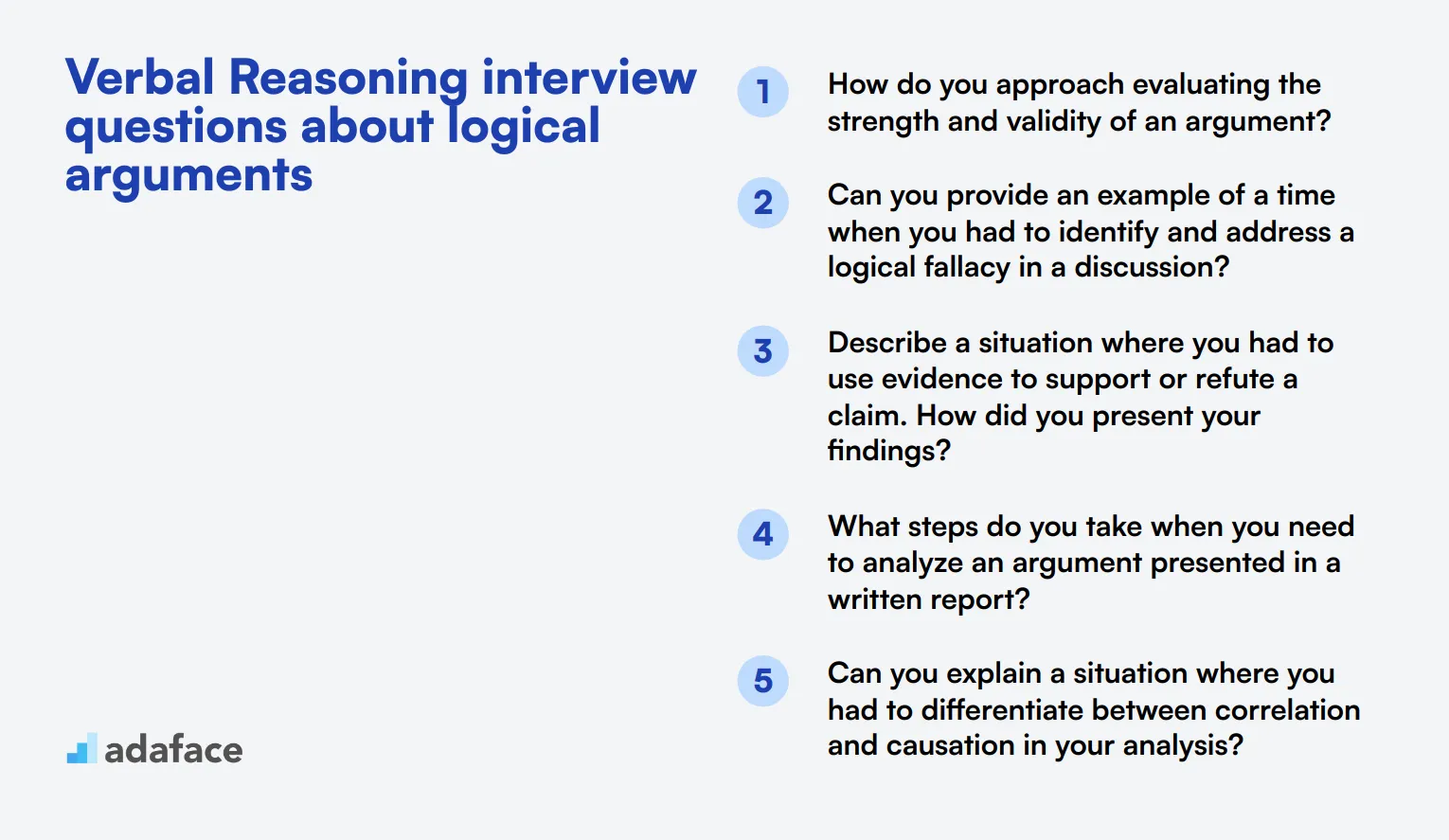
To effectively gauge a candidate's ability to form and assess logical arguments, consider using these 12 Verbal Reasoning interview questions about logical arguments. These questions are designed to help you understand how applicants think critically and communicate their reasoning. You can integrate these questions into your interviews for roles such as business analyst to accurately evaluate their verbal reasoning skills.
- How do you approach evaluating the strength and validity of an argument?
- Can you provide an example of a time when you had to identify and address a logical fallacy in a discussion?
- Describe a situation where you had to use evidence to support or refute a claim. How did you present your findings?
- What steps do you take when you need to analyze an argument presented in a written report?
- Can you explain a situation where you had to differentiate between correlation and causation in your analysis?
- How do you determine whether a conclusion logically follows from its premises?
- Describe your process for breaking down complex arguments into their component parts for evaluation.
- Can you give an example of a time when you had to challenge an assumption in a logical argument?
- What techniques do you use to ensure that your arguments are both logical and persuasive?
- How do you handle situations where you need to argue against a widely accepted belief or opinion?
- Describe a time when you had to evaluate multiple conflicting arguments to make a decision. How did you approach it?
- What methods do you use to test the validity of an argument before presenting it to others?
Which Verbal Reasoning skills should you evaluate during the interview phase?
Evaluating a candidate's verbal reasoning skills in a single interview can be challenging. While it's impossible to gauge every aspect of their capabilities, focusing on key verbal reasoning skills is essential for making informed hiring decisions.
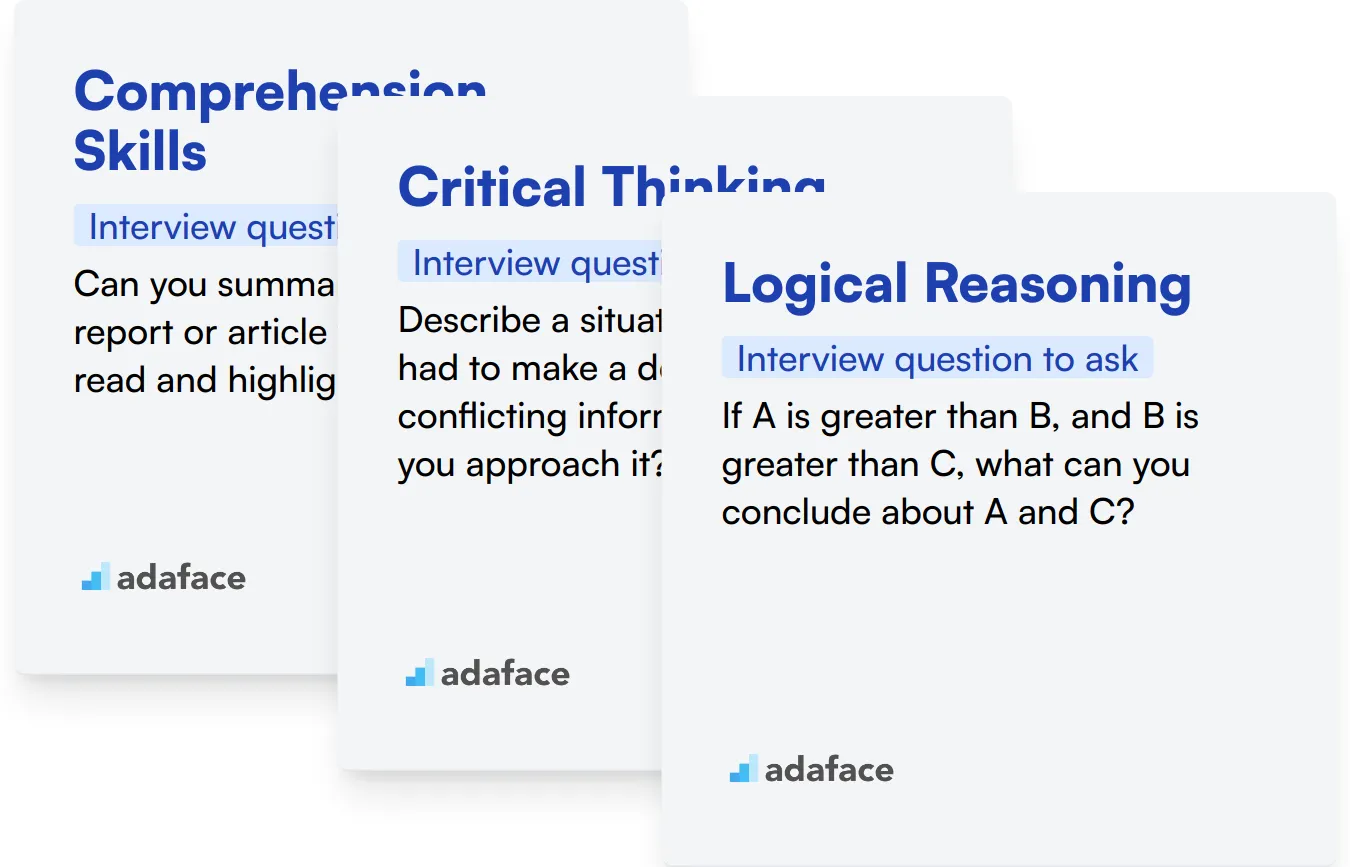
Comprehension Skills
To assess comprehension skills effectively, consider using a relevant MCQ-based assessment to filter candidates. You might explore our Verbal Reasoning test which includes questions designed to evaluate this skill.
Additionally, you can ask targeted interview questions to further evaluate comprehension skills. Here's an example:
Can you summarize a complex report or article you've recently read and highlight its key points?
Watch for the candidate's ability to distill key ideas and convey them succinctly. Look for clarity in their explanations and their grasp of the main arguments presented in the text.
Critical Thinking
To filter for critical thinking skills, consider administering a test that includes relevant MCQs. Our Critical Thinking test can serve as a valuable resource.
You can also pose interview questions that challenge candidates' critical thinking capabilities. For instance:
Describe a situation where you had to make a decision based on conflicting information. How did you approach it?
Listen for a structured approach to decision-making and their ability to weigh evidence from different sources. Assess their reasoning process and how they reached their conclusion.
Logical Reasoning
To evaluate logical reasoning skills, consider using a dedicated assessment that incorporates relevant MCQs. You can refer to our Logical Reasoning test for potential candidates.
Moreover, targeted questions can help assess a candidate's logical reasoning skills. For example:
If A is greater than B, and B is greater than C, what can you conclude about A and C?
Look for candidates who can quickly and accurately convey their reasoning process. Their ability to logically connect the dots will provide insights into their analytical capabilities.
Best Practices for Conducting Verbal Reasoning Interviews
Before you start applying what you've learned, here are some tips to make your Verbal Reasoning interviews more effective. These practices will help you get the most out of your candidate evaluations.
1. Incorporate Pre-Interview Assessments
Begin your evaluation process with pre-interview assessments to gauge candidates' Verbal Reasoning skills. This approach saves time and ensures you focus on the most promising applicants during interviews.
Consider using a Verbal Reasoning test or a Critical Thinking test to evaluate candidates' abilities. These tests can provide insights into a candidate's analytical and comprehension skills.
After administering the tests, review the results to identify strengths and areas for improvement. Use these insights to tailor your interview questions and focus on specific aspects of Verbal Reasoning during the in-person evaluation.
2. Prepare a Balanced Set of Interview Questions
Compile a mix of questions that cover various aspects of Verbal Reasoning. Include questions that assess comprehension, logical arguments, and analytical skills.
Consider adding related questions that evaluate other important skills, such as problem-solving or communication. This approach provides a more comprehensive evaluation of the candidate's abilities.
Remember to keep your question set concise, as interview time is limited. Focus on the most relevant questions that align with the job requirements and company culture.
3. Ask Thoughtful Follow-Up Questions
Don't rely solely on prepared questions. Ask follow-up questions to dig deeper into candidates' responses and assess their true understanding of the topic.
For example, if a candidate answers a question about analyzing a written argument, ask them to explain their reasoning process. This approach helps you evaluate their ability to articulate thoughts clearly and defend their positions.
Use Verbal Reasoning interview questions and skills tests to hire talented analysts
When hiring for roles that require strong verbal reasoning skills, it's important to verify that candidates possess these abilities accurately. The most effective way to achieve this is by utilizing skills tests like the Verbal Reasoning Test.
After implementing this test, you can effectively shortlist the best applicants for interviews. To get started, consider signing up at our online assessment platform for a seamless evaluation process.
Verbal Reasoning Test
Download Verbal Reasoning interview questions template in multiple formats
Verbal Reasoning Interview Questions FAQs
Verbal reasoning is the ability to understand and analyze written information, draw logical conclusions, and communicate ideas effectively.
Verbal reasoning skills are valuable for effective communication, problem-solving, and decision-making across various roles and industries.
Use a combination of questions that evaluate comprehension, logical thinking, and communication abilities, along with standardized verbal reasoning tests.
Examples include analyzing written passages, identifying analogies, evaluating arguments, and solving word problems or puzzles.
Questions for junior roles focus on basic comprehension and logic, while senior-level questions involve more complex analysis and problem-solving scenarios.

40 min skill tests.
No trick questions.
Accurate shortlisting.
We make it easy for you to find the best candidates in your pipeline with a 40 min skills test.
Try for freeRelated posts
Free resources




